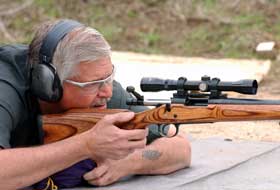I was originally posting this as a comment to my last post, but it got kind of long and I decided to give it a post of its own...
I believe we are at the tipping point I've been predicting for some time. I believe (and have told my consulting clients) that a large portion of the money that has left the hunting side of the market and gone to the present black market/handgun side of the market will not be coming back when the fever subsides.
My rationale is based on human behavior...we tend to go in the direction we're going in until acted upon by an outside force. Then we continue in that direction, etc.
Generally, I never recommend working against what we think of as "megatrends," macro trends that are shaping our current realities. In the case of hunting/shooting, those megatrends are urbanization/suburbanization, increased competition for leisure time, continued expansion of liability laws (there's a reason my property, prime mulie land, is posted) and, to a lesser extent, access issues. Regardless of what programs we as an industry might put in place, we can not significantly effect those trends, because they're societal in nature.
Instead, I am an advocate of bumping, or hitching a ride on, trends we can effect.
For example, sport and defensive shooting are both doing much better than hunting. If Michael ruled the Gun-iverse, I would put most of my money on increasing the upward-tending trends — sport and defensive — then build in a clearly defined "path" to hunting.
My idea would be to increase the big end of the funnel...
bring in more people through proven programs...and then recruit new hunters from already committed shooters. Remember, there are
two barriers to participating in hunting — purchasing the first gun and killing the first animal. My experience has been that hurdles, especially big hurdles, are best taken individually.
The industry, however, is addicted to hunter recruitment and retention programs that for the most part neither recruit nor retain lifelong hunters. I've used the scuba diving analogy before...a few years back I did some research for a book I was writing on why scuba diving has such a lousy retention number. here's a sport that has a large hurdle for participation — classes and licensing — is expensive and equipment-intensive and, generally, retains new scuba divers for a paltry 18-24 months. My conclusion was at least 1 megatrend — competition for leisure time — coupled with a side effect — you can't just
scuba-oooby oooby in your backyard. More importantly, my research, haphazard as it mght be, identified and interesting data point...longtime retention seemed to be tied to the accessibility and definition of an
upward path. Duh...people who were constantly learning their sport stayed in it longer. recruitment programs without an understanding of why people stay in the sport are, for the most part, a waste of time.
For example, I've been involved —
and not as much as I should have been! — in the current NSSF 20/20 initiative on building hunting and shooting sports. Here's my problem, which is apparently insoluable. The initiative has been built on data that ignores the entire defensive end of the culture and by their own admission —
"we have no data..." — overlooks owners and users of black rifles. Also, the NSSF study, while groundbreaking, is shot through and through with researcher error, especially concerning handguns and the handgun sports.
Once again, this "snapshot" of the culture has about 40% blacked out. I said that IMHO casual black rifles users represent as much as 20% + of the market...in essense, "plinking" with AR-15s can arguably be called the most popular shooting sport in America. How good can our recruitment and retention planning if we ignore whole market segments?
Instead, we come back to the same old, "Let's get young people hunting!" Great, except that hasn't worked for the last two decades. The most successful young shooter initiative in decades is NSSF's own Scholastic Clays pprogram...why are we not pouring money into
that, then recruit young hunters from the competiton base? The NSSF First Shots program is a huge success...let's do more of that...
LOTS more of that! If people want to shoot ARs — and a good way to do a reality check on that is cruise down to your local gunstore and ask what they don't have in stock, — then let's set up programs that help them to exactly that.






